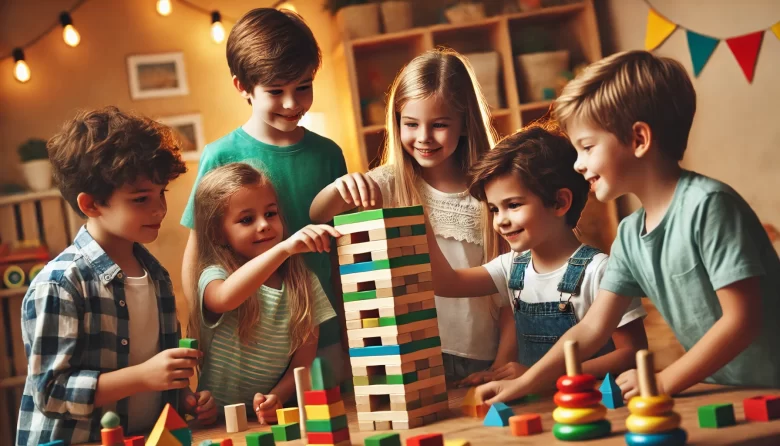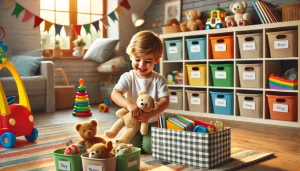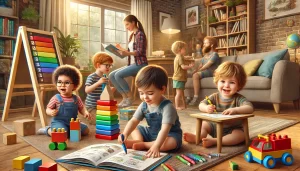Cooperation and teamwork are essential life skills that help children develop healthy relationships, solve problems effectively, and work towards common goals. Learning to collaborate with others teaches patience, empathy, and communication—skills that are crucial not only in childhood but also in adulthood.
In this article, we’ll explore the importance of teamwork, practical ways to encourage cooperation at home, and engaging activities that help children develop these skills in a fun and natural way.
Why Is Teaching Cooperation and Teamwork Important?
Children who learn to cooperate:
- Build stronger friendships through positive social interactions.
- Develop better problem-solving skills by working with others.
- Learn patience and compromise, essential for navigating life’s challenges.
- Gain confidence and self-esteem by contributing to group success.
At home, fostering teamwork can make daily routines smoother and create a more harmonious family environment.
How to Teach Cooperation and Teamwork at Home
Be a Role Model for Teamwork
Children learn by observing. Show cooperation in your daily life by:
- Working together as a family on household tasks.
- Expressing appreciation when someone helps you.
- Talking through disagreements calmly and respectfully.
When children see teamwork in action, they are more likely to adopt cooperative behaviors themselves.
Encourage Family Teamwork
Make cooperation a part of your family’s daily routine. Assign age-appropriate tasks that require working together, such as:
- Setting the table as a team.
- Cleaning up toys together.
- Planning a family outing with everyone contributing ideas.
When children see that their efforts help the whole family, they feel a sense of responsibility and accomplishment.
Teach Turn-Taking and Sharing
Many conflicts among children stem from struggles with sharing and taking turns. Reinforce these skills by:
- Using phrases like “Your turn, then my turn” to set clear expectations.
- Playing board games that require waiting and turn-taking.
- Encouraging children to trade toys rather than fight over them.
Practicing these small acts of cooperation in daily life builds a foundation for teamwork in larger situations.
Reinforce Positive Behavior
When you see your child cooperating, praise their efforts:
- “I love how you worked together with your sibling to build that tower!”
- “Great job taking turns with your friend during the game.”
Positive reinforcement encourages children to continue cooperating.
Let Kids Solve Conflicts Together
Instead of stepping in immediately, guide children in resolving their disagreements:
- Ask, “How can we find a solution that makes everyone happy?”
- Encourage them to listen to each other’s feelings.
- Offer suggestions if needed but allow them to decide together.
This teaches problem-solving skills and promotes independence in managing social situations.
Set Up Team-Based Challenges
Create situations where teamwork is necessary to complete a task. For example:
- Cooking Together – Have your child stir while you pour ingredients, reinforcing the idea that both roles are important.
- Cleaning Games – Turn tidying up into a group challenge: “Let’s see if we can clean the living room together in five minutes!”
- Building Projects – Work together to build a puzzle, a LEGO structure, or a fort.
When children see that collaboration leads to success, they’re more likely to embrace teamwork in other areas.
Fun Activities to Teach Cooperation and Teamwork
Group Art Projects
Set up an art project where multiple children contribute. For example:
- Have each child paint a section of a large picture.
- Work together to create a paper collage or mural.
This reinforces teamwork and shows that working together creates something wonderful.
Cooperative Board Games
Instead of competitive games, try board games where players work together towards a common goal. Examples include:
- Hoot Owl Hoot! – A teamwork-based game for younger kids.
- Forbidden Island – Encourages strategic teamwork in older children.
- Race to the Treasure! – Promotes collaborative problem-solving.
These games teach that success is better when shared.
“Human Knot” Game
Have children stand in a circle, reach across, and grab two different hands. The challenge is to untangle themselves without letting go. This activity strengthens problem-solving, patience, and communication.
Partner Obstacle Courses
Set up a small obstacle course and have children complete it together. Examples include:
- Walking while holding hands.
- Carrying a balloon between their backs without dropping it.
This helps children practice teamwork and coordination.
Storytelling Relay
Sit in a circle and take turns adding to a story. One child starts with a sentence, and the next child continues. This activity encourages cooperation in creative thinking.
Household Scavenger Hunt
Create a scavenger hunt where children must work together to find items around the house. Give them clues that require teamwork to solve.
Gardening Together
Assign each child a task in the garden, such as planting seeds, watering plants, or pulling weeds. Watching their efforts bloom teaches patience and cooperation.
How to Handle Challenges in Teaching Cooperation
When Siblings Argue Over Teamwork
- Encourage communication: “What do you each want, and how can we find a solution?”
- Teach compromise: “Let’s take turns being the leader.”
- Set rules in advance: “If we work together, we all win.”
When a Child Refuses to Cooperate
- Offer choices: “Do you want to help by setting the table or sweeping the floor?”
- Make it fun: “Let’s pretend we’re a superhero team saving the world!”
- Lead by example: Show cooperation in your own actions.
When Competition Takes Over
- Remind children that teamwork is more important than winning.
- Encourage group celebrations of success.
- Choose more cooperative games over competitive ones.
Final Thoughts
Cooperation and teamwork are lifelong skills that help children succeed in relationships, school, and future careers. By modeling teamwork, creating cooperative opportunities, and making collaboration fun, parents can help children develop the ability to work well with others.
By practicing these skills in everyday activities and structured games, children will learn that working together not only makes tasks easier but also more enjoyable!




